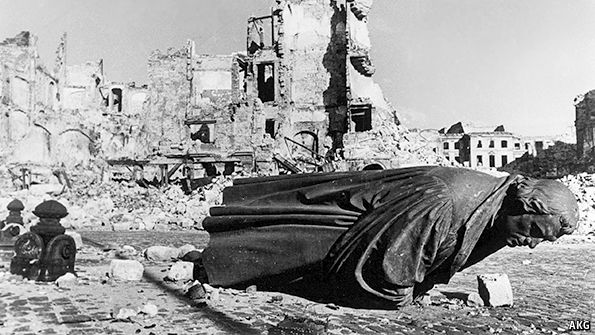| 原文请猛戳这里 》》》 European history 欧洲史 A grim half-century 黑暗的五十年 A fine addition to the Penguin “History of Europe” 对企鹅“欧洲史”丛书的一个绝好补充 Nov 14th 2015 | From the print edition  To Hell and Back: Europe 1914-1949. By Ian Kershaw. Viking; 624 pages; $35. Allen Lane; £30. 《地狱重生:欧洲 1914-1949》作者:伊恩·科修 ; 624页; 美国版 维京出版社 售价 $35 ;英国版 奥利雷恩出版社 售价£30 FOR Europe, as Ian Kershaw notes in this magisterial history, which came out in Britain in September and is just being published in America, the 20th century was a game of two halves. The first saw a cataclysm that brought down empires, plunged the continent into a deep slump and culminated in the horrors of the second world war. At least for Western Europe, the second was, in contrast, a triumph of peace and prosperity. That distinction may explain why Mr Kershaw has sensibly divided his original assignment to write the 20th-century volume in the Penguin “History of Europe” series into two books, of which this is the first. 对欧洲而言,正如伊恩·科修在这部已于9月份在英国上市、目前正在美国印刷的权威史中所言,20世纪是一场上下半场的博弈。上半场看到的一场带来了多个帝国崩溃、令这块大陆陷入了一场深度衰退、最后在第二次世界大战的恐怖中达到了高潮的灾难。与之相比,下半场,至少对西欧来说,是一场和平与繁荣的胜利。这种对比可能正是科修明智地将其为企鹅“欧洲史”丛书撰写20世纪卷的最初打算分解为了上下两册的原因。此书为上册。 His broad picture of what went wrong in Europe in the 20th century is built around four related points. First was the rise of ethnic nationalism, something that helped to doom the multinational empires of Austria-Hungary, Russia and the Ottomans. Next were demands for territorial revision, between France and Germany, in central and eastern Europe and all over the Balkans. Third was class conflict, as workers and a nascent socialist movement flexed their muscles against bosses and the traditional aristocratic ruling class. And fourth was the crisis of capitalism, which struck home in the early 1930s and contributed hugely to the rise of Nazism. 他的欧洲在20世纪怎么了的广阔画卷是围绕着四个相关要点构建起来的。一是促成了奥匈帝国、沙俄帝国和奥斯曼土耳其帝国等多民族帝国走向末日的民族国家主义的兴起,二是法德之间、中欧和东欧各国以及所有巴尔干国家对于重新划分领土的要求,三是随着工人阶层和初生的社会主义运动对资本家和传统贵族统治阶层展示力量而出现的阶级冲突,四是在三十年代初期重创了各个国家并对纳粹主义的兴起起了推波助澜作用的资本主义危机。 Mr Kershaw, an acknowledged expert on Germany and author of the best biography of Adolf Hitler, naturally places the two world wars at the heart of his narrative, with Germany standing condemned as the main cause of both. That is a more controversial position to take for the first than the second, but on the whole Mr Kershaw justifies his claim. He also delineates cogently and chillingly the way in which the collapse of the tsarist empire, brought about to a large extent by Russia's military and political setbacks during the first world war, led to the Bolshevik triumph and the creation of the Soviet Union, which in almost all respects was worse than what went before. 作为一位公认的德国问题专家和希特勒传记最佳版本的作者,科修自然把两次世界大战作为其叙述的中心。具体地说,德国被当做两次世界大战的主要原因而受到了重点的指责。这是一种对第一次世界大战较之对第二次世界大战所采取的更有争议性的立场。但是,科修基本上证明了他的观点。他还冷静而且中肯叙述了在很大程度上是拜第一次世界大战期间的军事和政治失败所赐的沙俄帝国的崩溃是如何导致了几乎在所有方面都是前所未有的糟糕的布尔什维克的胜利和苏联的建立。 The author shows how the failings of that first war's victors—the reparations fiasco, the Versailles treaty, America's withdrawal into isolationism—laid the ground for a path that led inexorably to the second. But he also insists that the path was not inevitable. The Locarno treaty of 1925 between Germany, France, Britain, Belgium and Italy, and the entry of Weimar Germany into the League of Nations, could, just about, have led to something rather like the rehabilitation of West Germany in the 1950s. What really took Europe back to the horrors that culminated in another war was economic collapse after 1929. Just as after the recent financial crisis of 2007-08, it was the political right, not the left, that benefited most from this collapse. In Europe that ultimately meant a snuffing out of democracy and the rise of the extreme right in Spain, much of central Europe and, above all, in Germany. 作者展示了第一场战争的胜利者的错误——赔款的彻底失败、凡尔赛条约以及美国退回孤立主义——如何为一条不可逆转的通向第二场战争的道路打下了基础。但是,他也坚持认为,这条道路不是不可避免的。1925年的法、德、英、比、意《洛迦诺公约》和魏玛共和国加入国际联盟曾经差一点就带来了类似于西德在五十年代的复兴。真正将欧洲拉回到在另一场战争中达到高潮的恐怖的是1929年之后的经济大衰退。正如2007-08年金融危机之后那样,那次衰退的最大获益者政治上的右派,而不是左派。在欧洲,其终极含义就是一次民主的奄奄一息以及极右翼在西班牙、大多数中欧国家,以及最后在德国的兴起。 Mr Kershaw's focus on Germany inevitably means a few weaknesses elsewhere. His strictures against the other great European tyrant of the period, Josef Stalin, are softer than those against Hitler. Indeed, he somewhat underplays the horrific history of the Soviet Union from the late 1920s up to the Nazi-Soviet pact of 1939. He has little to say on Turkey: no mention of Field-Marshal Allenby nor T.E. Lawrence, little on Kemal Ataturk. His treatment of the military story of the two world wars is succinct almost to the point of cursoriness, but this ground is well-tilled in other books. It is also obvious from his narrative that he is more interested in politics and war than in social, demographic and cultural changes, though he dutifully covers these too. 科修之于德国的关注不可避免地意味着其他方面的不足。较之希特勒,他对那个时代的欧洲的另一位大独裁者约瑟夫·斯大林的责难相对和缓。实际上,他多少弱化了苏联从二十年代末期到1939年苏德协议这段时间的恐怖历史。他对土耳其着墨不多:没有提及艾伦比元帅、T.E劳伦斯和凯末尔·阿塔蒂尔克。他对两次世界大战战事的处理,简明扼要,一带而过,好在这个领域已在另外几本书中中得到了较好的发掘。从他的叙述来看,他对政治和战争的兴趣明显地超过了对社会变迁、人口变动以及文化变革的兴趣,尽管他也尽职尽责地论述了这些内容。 As in previous volumes in the series, the editors have decided to dispense with footnotes and sources (though there is a useful bibliography). That may be understandable in a history aimed more at the general public than at fellow academics, but it is still annoying. Yet this is a worthy, impressive and well-written addition to a series that has become the definitive history of Europe for our times—and one that whets the appetite for his next volume. 正如这套丛书中的前几卷那样,编辑们已经决定放弃注释和来源(尽管有一个有用的参考文献)。对一套以普通读者而不是专家学者为对象的历史丛书来说,也许,这是可以理解的。但是,仍然会让人感到不适。然而,该书却是对一套已经成为我们时代的权威欧洲史丛书的一个有价值的、能给读者留下深刻印象的、质量上乘的补充——同时,它也是能吊起读者对下册的胃口的一本书。 From the print edition: Books and arts |
 |网站地图|手机版|小黑屋|关于我们|ECO中文网
( 京ICP备06039041号 )
|网站地图|手机版|小黑屋|关于我们|ECO中文网
( 京ICP备06039041号 )
GMT+8, 2026-1-5 09:05 , Processed in 0.072133 second(s), 26 queries .
Powered by Discuz! X3.5
© 2001-2025 Discuz! Team.